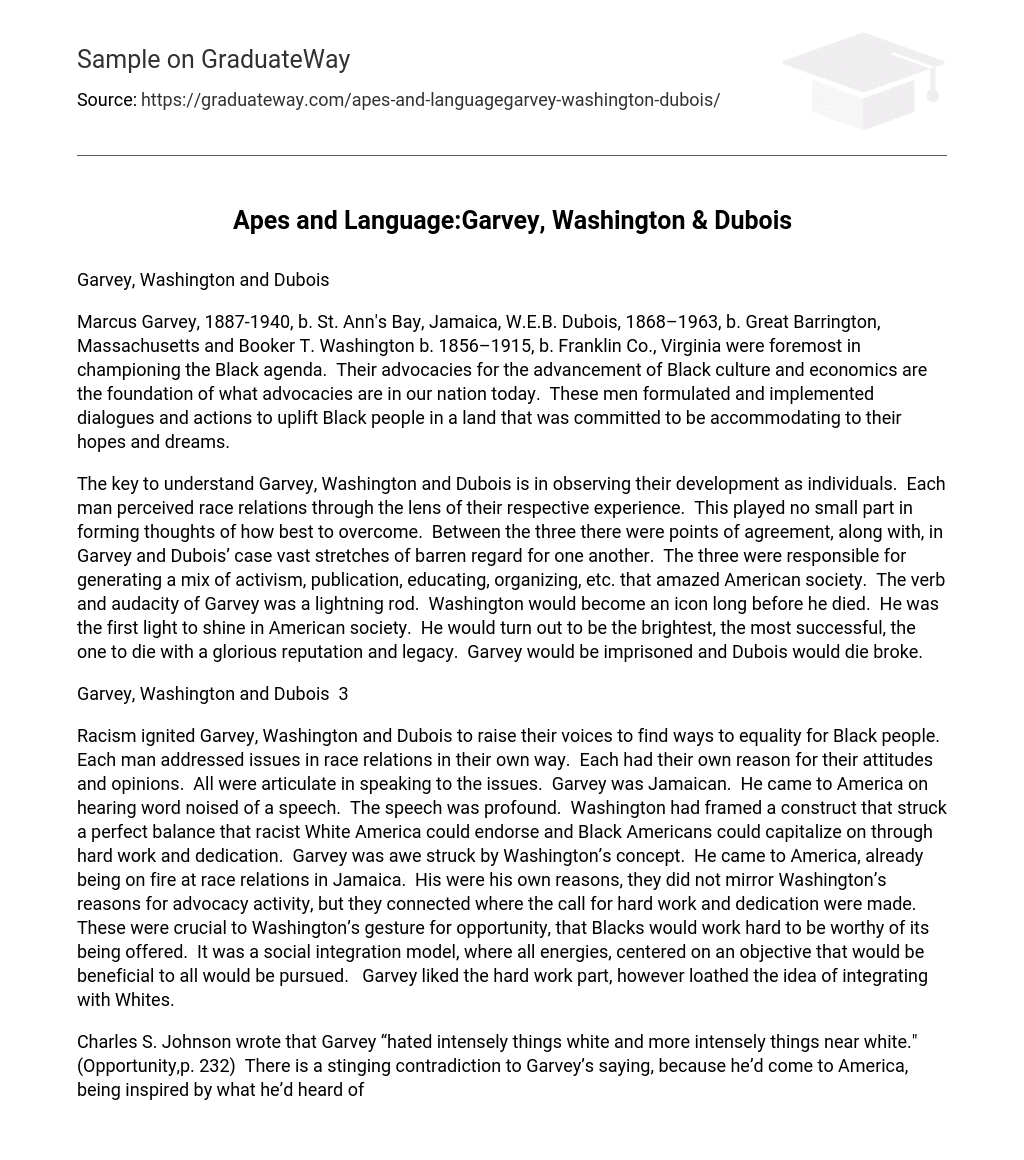Garvey, Washington and Dubois
Marcus Garvey, 1887-1940, b. St. Ann’s Bay, Jamaica, W.E.B. Dubois, 1868–1963, b. Great Barrington, Massachusetts and Booker T. Washington b. 1856–1915, b. Franklin Co., Virginia were foremost in championing the Black agenda. Their advocacies for the advancement of Black culture and economics are the foundation of what advocacies are in our nation today. These men formulated and implemented dialogues and actions to uplift Black people in a land that was committed to be accommodating to their hopes and dreams.
The key to understand Garvey, Washington and Dubois is in observing their development as individuals. Each man perceived race relations through the lens of their respective experience. This played no small part in forming thoughts of how best to overcome. Between the three there were points of agreement, along with, in Garvey and Dubois’ case vast stretches of barren regard for one another. The three were responsible for generating a mix of activism, publication, educating, organizing, etc. that amazed American society. The verb and audacity of Garvey was a lightning rod. Washington would become an icon long before he died. He was the first light to shine in American society. He would turn out to be the brightest, the most successful, the one to die with a glorious reputation and legacy. Garvey would be imprisoned and Dubois would die broke.
Garvey, Washington and Dubois 3
Racism ignited Garvey, Washington and Dubois to raise their voices to find ways to equality for Black people. Each man addressed issues in race relations in their own way. Each had their own reason for their attitudes and opinions. All were articulate in speaking to the issues. Garvey was Jamaican. He came to America on hearing word noised of a speech. The speech was profound. Washington had framed a construct that struck a perfect balance that racist White America could endorse and Black Americans could capitalize on through hard work and dedication. Garvey was awe struck by Washington’s concept. He came to America, already being on fire at race relations in Jamaica. His were his own reasons, they did not mirror Washington’s reasons for advocacy activity, but they connected where the call for hard work and dedication were made. These were crucial to Washington’s gesture for opportunity, that Blacks would work hard to be worthy of its being offered. It was a social integration model, where all energies, centered on an objective that would be beneficial to all would be pursued. Garvey liked the hard work part, however loathed the idea of integrating with Whites.
Charles S. Johnson wrote that Garvey “hated intensely things white and more intensely things near white.” (Opportunity,p. 232) There is a stinging contradiction to Garvey’s saying, because he’d come to America, being inspired by what he’d heard of Booker T. Washington’s speech. Booker T. Washington was sired by a White man in the comfort of a slave woman’s arms.” The product proved to be a magnificent human being, a man esteemed in the highest echelons of society,
Garvey, Washington and Dubois 4
including most Black intelligentsia. Garvey came to America, inspired by a mulatto American, yet he wrote that he hated “more intensely things that are near White.”
There’d been nothing before, Washington’s speech before the CS&I Exposition in 1895, it was a viable plan to change the paradigm of race relations in America. In one fell swoop Washington laid the foundation to assure he’d be taken care of for the rest of his life. He’d been born a slave. He’d raised to the top of American society with one speech.
The same year of Washington’s ground-breaking speech W.E.B. Dubois was the first Black to earn a “graduate degree from Harvard.” (http://www.issues-views.com) He was a native of Massachusetts. He’d earned the degree and founded what would become stalwart Civil Rights organization NAACP, but it was Washington who became the darling of the nation, in particular White society. Dubois was sophisticated, well healed aristocratic in a way. He shared to a measurable extent in the idea of Black advancement and a parallel development of culture. Dubois wasn’t integrative in the since that Washington was. Washington had a White father, yet had also been a slave. He was that image that Garvey hated where being mulatto was concerned, yet Washington’s appeal was unavoidable for his call to hard work and diligence that Garvey did admire. Dubois was prejudiced at what he perceived to be Garvey’s animalistic presence. Garvey had no regard for the cosmopolitan snobbery he perceived of Dubois, yet they all worked diligently for Civil Rights.
Works Cited
(Opportunity, Aug. 23 edition p. 232), http://www.ritesofpassage.org/garvey_dubois.htm
Thornbrough, E. L. (ed.) 1969 Great Lives Observed: Booker T. Washington. Englewood Cliffs, NJ: Prentice-Hall., http://www.vernonjohns.org/vernjohns/bookert.html
http://www.issues-views.com/index.php/sect/1000/article/999





